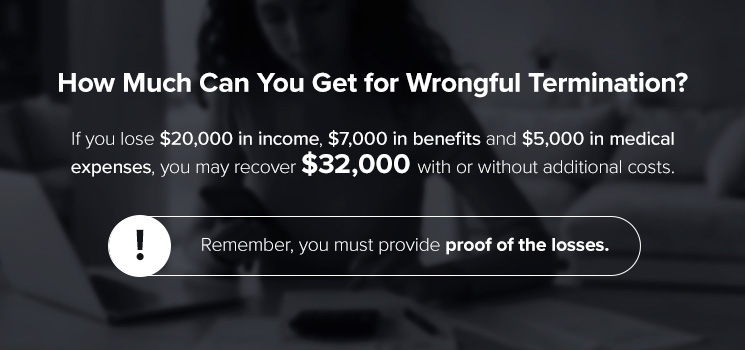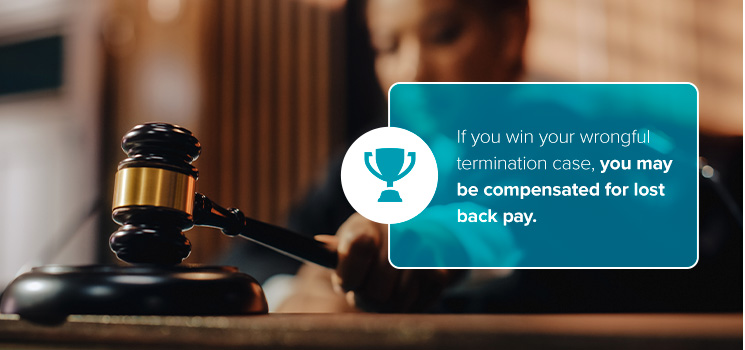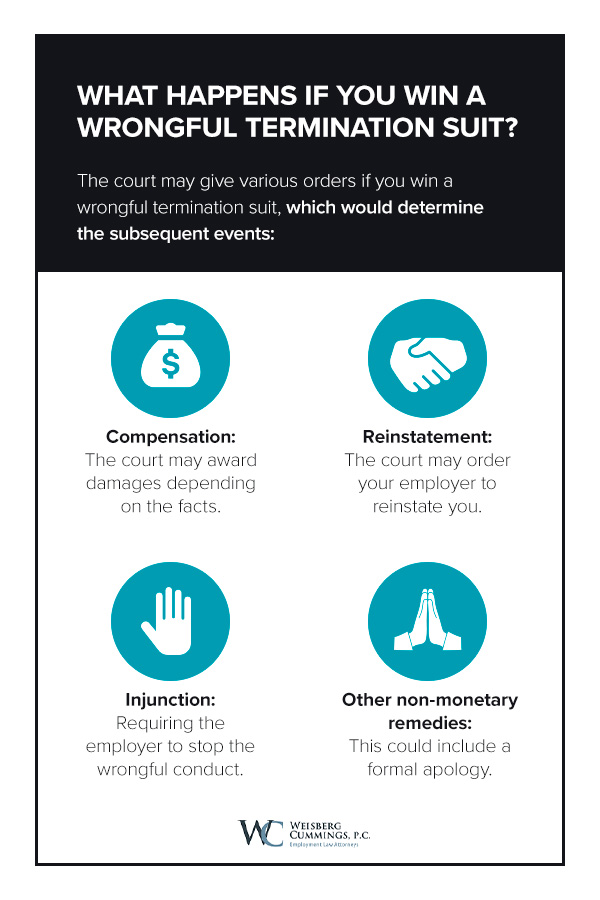If you believe you have a claim for wrongful termination, one of your first considerations is likely how much you will be able to recover in a settlement. While there is no wrongful termination calculator that can provide an exact value of your settlement before going to trial, there are ways to estimate what you might recover if your case is successful.
Verdicts often represent compromises and juries do not use any specific formula, but estimations can be made based on the circumstances of your situation. At Weisberg Cummings, P.C., we have decades of experience in employment law matters, so we can help you determine whether you have a case and how much you may recover in a wrongful termination settlement.
How Much Can You Get for Wrongful Termination?
Different factors determine how much you can win for wrongful termination. Classic examples include the nature of unlawful conduct, the extent of losses incurred and circumstances surrounding your search for a new job. For example, if you lose $20,000 in income, $7,000 in benefits and $5,000 in medical expenses, you may recover $32,000 with or without additional costs. Remember, you must provide proof of the losses.
Mitigation factors are also vital considerations. In other instances, the court may order the employer to pay the expenses incurred in attorney fees and other legal costs. The variables can change from case to case, so it’s best to consult an employment lawyer for tailored advice.
What Damages Can You Recover in Wrongful Termination Cases?
You may be able to sue for and recover compensation for several different types of damage in a wrongful termination case, including:
1. Medical Expenses
Job loss affects your emotional well-being and can also take a toll on your physical health. Emotional stressors can even manifest as physical symptoms. If you file a wrongful termination lawsuit, you may be able to seek compensation for your medical expenses and the cost of psychological counseling if you needed it to cope with your emotional distress.
You may also be able to recover compensation for pain and suffering, which is considered non-economic damages. The amount you can receive for pain and suffering depends on the jurors.
2. Lost Benefits and Earnings
If you win your wrongful termination case, you may be compensated for lost back pay. This is based on the earnings you would have received if you had remained employed. Along with your regular pay, lost earnings may include bonuses and earnings growth, such as promotions and raises.
Benefits are essential to compensation packages, so lost benefits should also be included in the calculations for economic damages in a wrongful termination case. Your benefits may include health care coverage, vision coverage, dental coverage, retirement savings, stock options and a pension plan.
Keep in mind the court will expect you to mitigate your losses, meaning you should look for a similar job at a similar pay as soon as you are terminated. If you deliberately fail to mitigate your losses and your employer can prove this, mitigation sums may be calculated and subtracted from your total lost earnings compensation.
3. Job Search Costs
After being wrongfully terminated, you may incur significant costs in your efforts to seek new employment. Costs that you may incur during your job search include attending job fairs, membership in professional organizations, wardrobe expenses and travel expenses.
If you file for these damages, you may receive a larger award than if you do not claim compensation for your job search costs. Courts tend to treat plaintiffs more favorably if they can show they have made efforts to find new employment.
4. Punitive Damages and Attorney Fees
Punitive damages are the amount you can recover from your former employer if they committed any egregious or outrageous actions. Though other damages are intended to compensate you for your losses, punitive damages are meant to punish the employer and prevent similar behavior in the future.
Punitive damages are not available for every wrongful termination claim, but they may be available in your case if your former employer behaved egregiously. The amount you can recover is usually up to the jury. Along with punitive damages, you may also be able to recover the fees you paid to attorneys during the course of your wrongful termination case and any court costs you incurred.
What Happens if You Win a Wrongful Termination Suit?
The court may give various orders if you win a wrongful termination suit, which would determine the subsequent events:
- Compensation: The court may award damages depending on the facts or circumstances surrounding the case. The purpose is to compensate you for the losses incurred due to the wrongful termination. The amount could cover emotional distress, lost benefits and other financial impacts.
- Reinstatement: The court may order your employer to reinstate you to your position if you wish to return to your former job. If a promotion is due, the court may also order the employer to effect it.
- Injunction: The court may issue an injunction requiring the employer to stop the wrongful conduct or to take specific action to remedy the situation. If your employer disobeys the court’s orders, they could be held in contempt of court.
- Other non-monetary remedies: This could include a formal apology from the employer, changes to the company policies or training for supervisors to prevent future wrongful terminations.
How Much Are Wrongful Termination Settlements?
In Pennsylvania, wrongful termination cases are often settled outside the courtroom. In some cases, the parties do not settle and a trial will follow, in which one party will win. The range of compensation Pennsylvania residents can expect from a wrongful termination settlement is vast, from just a few thousand dollars to tens of thousands of dollars. Settlements also tend to have a lower value than jury awards, which is why many organizations push to settle outside of court.
As such, having an experienced attorney on your side is essential. Your attorney can often negotiate a larger settlement and help you determine which option is right for you. An attorney can help you strengthen your case and navigate settling outside of court or proving your case during trial.
In Pennsylvania, there have been many wrongful termination cases that ended in settlements. Below are some examples of wrongful termination settlements in the state:
EEOC v. Saint Vincent Health Center
During the flu season in 2013, six employees at Saint Vincent Hospital, located in Erie, Pennsylvania, requested exemptions from the requirement to get an annual flu shot due to religious beliefs. However, the hospital denied the employees’ requests and fired them for refusing to get vaccinated. Though the hospital denied the religious exemption requests, they granted several medical exemption requests.
The Equal Employment Opportunity Commission (EEOC) sued Saint Vincent Hospital on behalf of the employees who were wrongfully terminated on the basis of religious discrimination. The case was settled for $300,000, and the terminated employees were able to return to their jobs.
EEOC v. Verizon
Another example of a wrongful termination settlement in Pennsylvania involved Verizon and an employee, Lissa Hannan, who was a senior field clerk. After she was told to work for a male contractor in a neighboring office, he began sexually harassing her. She made a complaint about the sexual harassment to her supervisor and was reassigned to a different location pending an investigation. Ten days later, she was fired from her job.
The EEOC sued Verizon on Hannan’s behalf, stating that the company was in violation of Title VII of the Civil Rights Act, which states sex discrimination or terminating an employee for reporting sex discrimination is illegal. The case was settled, and Hannan received a $37,000 settlement.
Tips for Negotiating Wrongful Termination Settlements
Negotiating a wrongful termination settlement can be a complex process. Here are some tips to help you navigate this negotiation effectively:
- Understand your rights: Before entering negotiations, clearly understand your rights under employment law and the specifics of your wrongful termination case. That will enable you to develop a practical plan.
- Understand the damages available: Note every statute provides the same opportunities for damages. An attorney specializing in employment law will be able to explain what types of damages may be available depending on the nature of your case and the laws which are implicated.
- Gather evidence: The evidence available can determine the success of your settlement. Employers may be more likely to settle if you have strong evidence to support your claim. This may include emails, witness and performance evaluations.
- Assess your damages: Assess the financial losses and emotional distress suffered due to the wrongful termination. Understanding your damages clearly can help you negotiate a fair settlement.
- Determine your goals: Clarify your objectives for the negotiation, whether obtaining financial compensation or seeking reinstatement.
- Keep communication professional: Maintain a professional demeanor and tone during negotiations. Avoid emotional reactions, and focus on presenting your case early and objectively.
- Consult with an employment lawyer: Seek legal advice from an attorney specializing in employment law. They can provide guidance on the strength of your case, the potential value of your claim and negotiation strategies.
Want to Learn More About Wrongful Termination Payout in Pennsylvania? Schedule a Free Consultation Today
At Weisberg Cummings, P.C., our lawyers assist individuals in Pennsylvania who have been wronged by an employer. We aim to provide personalized service, so we dedicate time to getting to know you and your circumstances. With more than four decades of combined experience, our employment lawyers can stand up for your rights in any employment legal matter.
Along with wrongful termination, we can handle contract disputes, employer retaliation and unpaid wage claims. If you are a Pennsylvanian who has been wrongfully terminated, you deserve justice. Contact us now at Weisberg Cummings, P.C., to schedule your free consultation.






